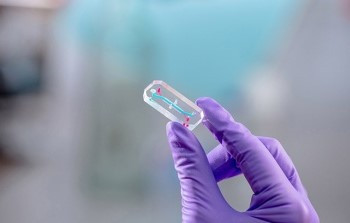Project
Advancing Human Synovial Joint Chips
| Primary Investigator: | Dr Karina Wright Keele University |
| Co-investigators: | Prof Sally Roberts Keele University |
| Dr Charlotte Hulme Keele University | |
| Dr Clare Thompson Queen Mary University of London | |
| Funder: | Emulate/Organ-on-a-chip Network Proof-of-concept Award |
| Project dates: | 29-10-2020 to 29-10-2021 |
| Centre dates: | 29-10-2020 to 29-10-2021 |
Arthritis of the knee causes a huge amount of pain and disability. Whilst knee replacements are considered an excellent treatment for tens of thousands of people each year in Britain, many who have them don't return to the types or levels of activity they would like. Also the metal/plastic joints used in these procedures have a limited lifetime and may need replacing; such 'revisions' are always more difficult, expensive and more likely to fail than the original joint replacement. Our overarching aim is to improve existing surgical treatments for early osteoarthritis, delaying the need for joint replacement surgeries and providing a longer-lasting repair for more patients. Long-term outcome of treatments for early osteoarthritis currently is difficult to predict and hence, deciding how and who to treat remains a clinical challenge.
In the preliminary work to be undertaken at the Centre we will build on the work of Centre Scientist Dr Clare Thompson, who aims to develop a simple synovial chip with a blood vessel component starting in September this year (2020). She advises that the chip will be ready to be advanced with samples obtained from patients with early and late osteoarthritis (which can be readily obtained from our hospital) early in 2021. We will use the chips available from this proof of concept (POC) fund in addition to chips purchased through parallel funding (if successful) to characterise early and late-stage osteoarthritis chips through the inflammatory proteins that the cells within the chips express and secrete and after stimulation with donor-matched fluids derived from the same joints.
We have shown previously that responses to surgery can be detected in the fluids surrounding the knee joint and that these responses can relate to long term outcome (Hulme et al., 2017; 2018; 2020). We suspect that the synovial tissues in the joint play an important part in this predictive response as well as influencing how the disease progresses in each joint. The longer-term aim of this work is to develop an organ-on-a-chip synovial joint system that can be used to predict individual outcome to orthopaedic surgeries. Hence allowing surgeons to better screen suitable patients for each surgery. This will ensure that only those that are likely to benefit will receive certain surgeries and those destined to fail will not undergo unnecessary procedures.
The data derived from this POC experiments will be used to apply for larger grant applications to Versus Arthritis and the MRC and BBSRC, which will aim to build on the complexity of the chip tissues, incorporate injury models and to relate the responses from individual donor chips to surgical outcomes obtained in the clinic, hence advancing human synovial joint chips for individual orthopaedic surgical screening, as well as possibly determining slightly different types of osteoarthritis



